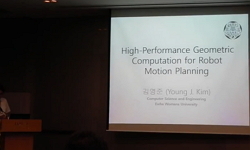Computation is central to the foundations of modern cognitive science, but its role is controversial. Questions about computation abound: What is it for a physical system to implement a computation? Is computation sufficient for thought? What is the r...
http://chineseinput.net/에서 pinyin(병음)방식으로 중국어를 변환할 수 있습니다.
변환된 중국어를 복사하여 사용하시면 됩니다.
- 中文 을 입력하시려면 zhongwen을 입력하시고 space를누르시면됩니다.
- 北京 을 입력하시려면 beijing을 입력하시고 space를 누르시면 됩니다.


A Computational Foundation for the Study of Cognition = A Computational Foundation for the Study of Cognition
한글로보기https://www.riss.kr/link?id=A60239067
-
저자
( David J Chalmers ) (Australian National University)
- 발행기관
- 학술지명
- 권호사항
-
발행연도
2011
-
작성언어
-
- 주제어
-
등재정보
SCOPUS,KCI등재,ESCI
-
자료형태
학술저널
-
수록면
323-357(35쪽)
- DOI식별코드
- 제공처
-
0
상세조회 -
0
다운로드
부가정보
다국어 초록 (Multilingual Abstract)
Computation is central to the foundations of modern cognitive science, but its role is controversial. Questions about computation abound: What is it for a physical system to implement a computation? Is computation sufficient for thought? What is the role of computation in a theory of cognition? What is the relation between different sorts of computational theory, such as connectionism and symbolic computation? In this paper I develop a systematic framework that addresses all of these questions. Justifying the role of computation requires analysis of implementation, the nexus between abstract computations and concrete physical systems. I give such an analysis, based on the idea that a system implements a computation if the causal structure of the system mirrors the formal structure of the computation. This account can be used to justify the central commitments of artificial intelligence and computational cognitive science: the thesis of computational sufficiency, which holds that the right kind of computational structure suffices for the possession of a mind, and the thesis of computational explanation, which holds that computation provides a general framework for the explanation of cognitive processes. The theses are consequences of the facts that (a) computation can specify general patterns of causal organization, and (b) mentality is an organizational invariant, rooted in such patterns. Along the way I answer various challenges to the computationalist position, such as those put forward by Searle. I close by advocating a kind of minimal computationalism, compatible with a very wide variety of empirical approaches to the mind. This allows computation to serve as a true foundation for cognitive science.
동일학술지(권/호) 다른 논문
-
Beyond Formal Structure: A Mechanistic Perspective on Computation and Implementation
- 서울대학교 인지과학연구소
- ( Marcin Mi Kowski )
- 2011
- SCOPUS,KCI등재,ESCI
-
Defending the Semantic Conception of Computation in Cognitive Science
- 서울대학교 인지과학연구소
- ( Gerard O Brien )
- 2011
- SCOPUS,KCI등재,ESCI
-
Chalmers on Implementation and Computational Sufficiency
- 서울대학교 인지과학연구소
- ( J Brendan Ritchie )
- 2011
- SCOPUS,KCI등재,ESCI
-
Home, Pause, or Break: A Critique of Chalmers on Implementation
- 서울대학교 인지과학연구소
- ( Brandon N Towl )
- 2011
- SCOPUS,KCI등재,ESCI




 KCI
KCI KISS
KISS






